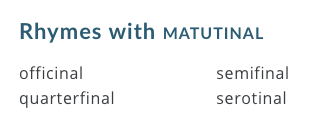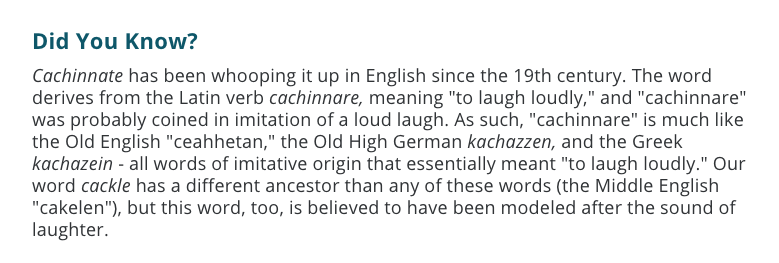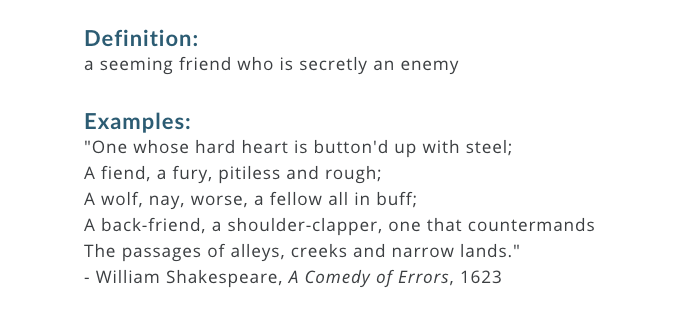As a gift to our friends (you) in a time of crisis, we’ll be keeping a thread here of beautiful, obscure, and often quite useless words.
(Compiled by our in-house expert in pointless vocab @ammonshea.)
3. 'Flingee': one at whom anything is flung
(Oxford English Dictionary, 2nd Ed., 1989)
(Oxford English Dictionary, 2nd Ed., 1989)
4. 'Jentacular': pertaining to breakfast
(Webster’s New International Dictionary, 2nd Ed., 1934)
(Webster’s New International Dictionary, 2nd Ed., 1934)
8. 'Penultimatum': a demand or proposal approaching an ultimatum
(Webster’s New International Dictionary, 2nd Ed., 1934)
(Webster’s New International Dictionary, 2nd Ed., 1934)
9. 'Matutinal': of, relating to, or occurring in the morning
rhymes.merriam.com/r/matutinal
Here are some words that rhyme with it.
rhymes.merriam.com/r/matutinal
Here are some words that rhyme with it.

11. 'Acersecomicke': one whose hair was never cut
(Henry Cockeram, English Dictionarie, 1623)
(Henry Cockeram, English Dictionarie, 1623)
15. 'Catillate': to licke dishes
(Henry Cockeram, English Dictionarie, 1623)
This one gets bonus points for having an obsolete spelling in the definition of the obsolete word.
(Henry Cockeram, English Dictionarie, 1623)
This one gets bonus points for having an obsolete spelling in the definition of the obsolete word.
16: 'Tongue-hero': a self-professed hero; a braggart
(Webster’s New International Dictionary, 2nd Ed., 1934)
(Webster’s New International Dictionary, 2nd Ed., 1934)
21. 'Abligurition': a prodigal spending in Belly-Cheer
(Nathan Bailey, An universal etymological English dictionary, 1724)
(Nathan Bailey, An universal etymological English dictionary, 1724)
24. 'Shot-clog': a bore tolerated only because he pays the charge for others
merriam-webster.com/dictionary/sho…
merriam-webster.com/dictionary/sho…
25: 'Philostorgie': the love of parents towards their children”
(Thomas Blount, Glossographia, 1656)
(Thomas Blount, Glossographia, 1656)
26: 'Frivol': to act frivolously : trifle
merriam-webster.com/dictionary/fri…
merriam-webster.com/dictionary/fri…
27. 'Smell-feast': one given to finding out and getting invited to good feasts; a parasite, sponger
merriam-webster.com/words-at-play/…
merriam-webster.com/words-at-play/…
28. 'Sialoquent': that spits much in his speech
(Thomas Blount, Glossographia, 1656)
(Thomas Blount, Glossographia, 1656)
29. 'Murmuration': the utterance of low continuous sounds or complaining noises merriam-webster.com/dictionary/mur…
30. 'Redame': to love in return
(Webster’s New International Dictionary, 2nd Ed., 1934)
(Webster’s New International Dictionary, 2nd Ed., 1934)
32. 'Pessimum': the least favorable environmental condition under which an organism can survive
merriam-webster.com/words-at-play/…
merriam-webster.com/words-at-play/…
33. 'Ucalegon': a next-door neighbor, or a neighbor whose house is on fire
(Webster’s New International Dictionary, 2nd Ed., 1934)
This one kinda goes from zero to sixty.
(Webster’s New International Dictionary, 2nd Ed., 1934)
This one kinda goes from zero to sixty.
36. 'Nastify': to make nasty; to spoil
(Oxford English Dictionary, 3rd Ed.)
(Oxford English Dictionary, 3rd Ed.)
38. 'Debacchate': to revile one after the manner of drunkards
(Henry Cockeram, English Dictionarie, 1623)
(Henry Cockeram, English Dictionarie, 1623)
40. 'Pot-valiant': bold or courageous under the influence of alcoholic drink
merriam-webster.com/dictionary/pot…
merriam-webster.com/dictionary/pot…
41. 'Cacozealous': ill affected, or badly imitating
(Edmund Phillips, The New World of English Words, 1658)
(Edmund Phillips, The New World of English Words, 1658)
44. 'Acnestis': the part of the back (or backbone) between the shoulder blades and the loins which an animal cannot reach to scratch
(Oxford English Dictionary, 3rd ed.)
merriam-webster.com/words-at-play/…
(Oxford English Dictionary, 3rd ed.)
merriam-webster.com/words-at-play/…
47. 'Perpotation': ordinarie drunkenesse
(Henry Cockeram, English Dictionarie, 1623)
#NationalBeerDay
(Henry Cockeram, English Dictionarie, 1623)
#NationalBeerDay
48. 'Saeva indignatio': ‘Savage indignation’, a feeling of contemptuous rage at human folly.
(Oxford English Dictionary, 3rd ed.)
(Oxford English Dictionary, 3rd ed.)
51. 'Novercal': of, relating to, or characteristic of a stepmother
merriam-webster.com/dictionary/nov…
merriam-webster.com/dictionary/nov…
52. 'Roorback': a defamatory falsehood published for political effect merriam-webster.com/dictionary/roo…
53. 'Ultracrepidarian': one who is presumptuous and offers advice or opinions beyond one’s sphere of knowledge
merriam-webster.com/words-at-play/…
merriam-webster.com/words-at-play/…
54. 'Nidorosity': eructation (an act of belching) with the taste of undigested roast-meat
(Samuel Johnson, A Dictionary of the English Language, 1755)
(Samuel Johnson, A Dictionary of the English Language, 1755)
55. 'Antithalian': opposed to festivities
(Webster’s New International Dictionary, 2nd Ed., 1934)
(Webster’s New International Dictionary, 2nd Ed., 1934)
57. 'Abirritate': to decrease the irritability of
(Webster’s New International Dictionary, 2nd Ed., 1934)
(Webster’s New International Dictionary, 2nd Ed., 1934)
58. 'Amatorculist': a little insignificant lover; a pretender to affection
(Samuel Johnson, A Dictionary of the English Language, 1755)
(Samuel Johnson, A Dictionary of the English Language, 1755)
59. 'Job's comforter': a person who discourages or depresses while seemingly giving comfort and consolation
merriam-webster.com/dictionary/Job…
merriam-webster.com/dictionary/Job…

60. 'Fleshment': excitement associated with a successful beginning merriam-webster.com/words-at-play/…
62. 'Accismus': the pretended refusal of something one keenly desires
(Oxford English Dictionary, 3rd ed.)
(Oxford English Dictionary, 3rd ed.)
64. 'Barbermonger': a man who is devoted to or vain about his appearance or dress merriam-webster.com/dictionary/bar…
65. 'Prefestinate': to make too much haste
(Henry Cockeram, English Dictionarie, 1623)
(Henry Cockeram, English Dictionarie, 1623)
67. 'Maritality': excessive fondness of a wife for her husband
(Webster’s New International Dictionary, 2nd Ed., 1934)
(Webster’s New International Dictionary, 2nd Ed., 1934)
68. 'Serendipitist': one who finds valuable or agreeable things not sought for merriam-webster.com/dictionary/ser…
69. 'Snickersnee'
- to engage in cut-and-thrust fighting with knives
- a large knife
merriam-webster.com/words-at-play/…
- to engage in cut-and-thrust fighting with knives
- a large knife
merriam-webster.com/words-at-play/…
70. 'Paracme': a point or period at which the prime or highest vigour is past; (in early use) spec. - the point when the crisis of a fever is past.
(Oxford English Dictionary, 3rd ed.)
(Oxford English Dictionary, 3rd ed.)
71. 'Spanghew': to throw violently into the air; especially, to throw (a frog) into the air from the end of a stick merriam-webster.com/words-at-play/…
72. 'Neighborstained': stained with the blood of neighbors
(Webster’s New International Dictionary, 2nd Ed., 1934)
(Webster’s New International Dictionary, 2nd Ed., 1934)
78. 'Pennyweighter': a thief that steals jewelry by substituting a fake for a valuable piece merriam-webster.com/words-at-play/…
79. 'Alluvium': clay, silt, sand, gravel, or similar detrital material deposited by running water merriam-webster.com/words-at-play/…
81. 'Backspang': a trick or loophole that enables one to retreat from a bargain
merriam-webster.com/dictionary/bac…
merriam-webster.com/dictionary/bac…
84. 'Lip-worshiper': one that worships in utterance only : one affirming devotion or fidelity without corresponding action
merriam-webster.com/dictionary/lip…
merriam-webster.com/dictionary/lip…
86. 'Antipelargy': “the reciprocal love of children to their Parents, or (more generally) any requital or mutual kindness”
(Thomas Blount, Glossographia, 1656)
(Thomas Blount, Glossographia, 1656)
89. 'Averuncate': “to take away that which hurts, to weed”
(Henry Cockeram, English Dictionarie, 1623)
(Henry Cockeram, English Dictionarie, 1623)
91. 'Artophagous': bread-eating
(Webster’s New International Dictionary, 2nd Ed., 1934)
(Webster’s New International Dictionary, 2nd Ed., 1934)
92. 'Backslide': to lapse morally or in the practice of religion
merriam-webster.com/dictionary/bac…
merriam-webster.com/dictionary/bac…
93. 'Barbatulous': having but a small beard
(Oxford English Dictionary, 2nd ed.)
(Oxford English Dictionary, 2nd ed.)
95. 'Ambitionist': one excessively ambitious
(Webster’s New International Dictionary, 2nd Ed., 1934)
(Webster’s New International Dictionary, 2nd Ed., 1934)
96. 'Satisfice': to pursue the minimum satisfactory condition or outcome merriam-webster.com/words-at-play/…
98. 'Apricitie': “The warmenes of the Sunne in winter”
(Henry Cockeram, English Dictionarie, 1623)
(Henry Cockeram, English Dictionarie, 1623)
102. 'Malobservation': erroneous observation or interpretation merriam-webster.com/dictionary/mal…
104. 'Leucocholy': a state of feeling that accompanies preoccupation with trivial and insipid diversions
merriam-webster.com/words-at-play/…
merriam-webster.com/words-at-play/…
106. 'Mordacious': biting or sharp in manner or style : caustic merriam-webster.com/dictionary/mor…
108. 'Desticate': “To cry like a rat”
(Henry Cockeram, English Dictionarie, 1623)
(Henry Cockeram, English Dictionarie, 1623)
109. 'Hamartia': a defect of character : error, guilt, or sin especially of the tragic hero in a literary work
merriam-webster.com/dictionary/ham…
merriam-webster.com/dictionary/ham…
You've had three months to prepare for this quiz. The cheat sheet is right in front of you. Can you ace it?
merriam-webster.com/word-games/use…
merriam-webster.com/word-games/use…
110. 'Gobemouche': a credulous person; especially: one who believes everything he or she hears
merriam-webster.com/words-at-play/…
merriam-webster.com/words-at-play/…

111. 'Impedimenta': things that impede or hinder progress or movement; especially : baggage, equipment, or supplies
merriam-webster.com/words-at-play/…
merriam-webster.com/words-at-play/…
112. 'Jocoserious': mingling mirth and seriousness
(Webster’s New International Dictionary, 2nd Ed., 1934)
(Webster’s New International Dictionary, 2nd Ed., 1934)
114. 'Forplaint': wearied with complaining
(Oxford English Dictionary, 2nd ed.)
(Oxford English Dictionary, 2nd ed.)
115. 'Homodox': having the same opinion
(Webster’s New International Dictionary, 2nd Ed., 1934)
(Webster’s New International Dictionary, 2nd Ed., 1934)
116. 'Imparadise': to make supremely happy, transport with delight or joy
merriam-webster.com/words-at-play/…
merriam-webster.com/words-at-play/…
117. 'Logomachist': one given to dispute over or about words merriam-webster.com/words-at-play/…
118. 'Backlotter': one who raises poultry or rabbits on a small lot, usually a back lot merriam-webster.com/words-at-play/…
119. 'Lowery': gloomy, lowering merriam-webster.com/dictionary/low…
121. 'Malversation': misbehavior and especially corruption in an office, trust, or commission merriam-webster.com/dictionary/mal…
122. 'Inhesion': the condition of being inherent in something merriam-webster.com/dictionary/inh…
123. 'Estivo-autumnal': relating to or occurring in the summer and autumn merriam-webster.com/words-at-play/…
124. 'Unclubbable': having or showing a disinclination for social activity : unsociable merriam-webster.com/words-at-play/…
126. 'Father-waur': worse than one's father
(Oxford English Dictionary, 3rd ed.)
(Oxford English Dictionary, 3rd ed.)
128. 'Groak': to look on silently—like a dog—at people while they are eating, hoping to be asked to eat a bit
(P. W. Joyce, English as We Speak it in Ireland, 1910)
merriam-webster.com/words-at-play/…
(P. W. Joyce, English as We Speak it in Ireland, 1910)
merriam-webster.com/words-at-play/…
129. 'Mussitate': to speak through the teeth
(Henry Cockeram, An English Dictionarie, 1623)
(Henry Cockeram, An English Dictionarie, 1623)
130. 'Pandiculation': a stretching and stiffening especially of the trunk and extremities (as when fatigued and drowsy or after waking from sleep) merriam-webster.com/medical/pandic…
131. 'Satisdiction': the condition of having said enough
(Webster’s New International Dictionary, 2nd Ed., 1934)
(Webster’s New International Dictionary, 2nd Ed., 1934)
132. 'Corruptionist' - one who practices or defends corruption especially in politics merriam-webster.com/dictionary/cor…
133. 'Cicatrizant' - promoting the healing of a wound or the formation of a cicatrix merriam-webster.com/medical/cicatr…
134. 'Macrologie': Long and tedious talke
(John Bullokar, An English Expositor, 1616)
(John Bullokar, An English Expositor, 1616)
135. 'Réclame': public attention or acclaim not necessarily based on or proportionate to real value or achievement
(M-W Unabridged)
(M-W Unabridged)
136. 'Beneficence': the quality or state of doing or producing good merriam-webster.com/dictionary/ben…
137. 'Ballon d’essai' - trial balloon; a project or scheme tentatively announced in order to test public opinion merriam-webster.com/dictionary/bal…
139. 'Anedged': Of teeth: set on edge; acutely irritated or discomforted
(Oxford English Dictionary, 3rd Edition)
(Oxford English Dictionary, 3rd Edition)
140. 'Disobligation': an act that purposely inconveniences or offends merriam-webster.com/dictionary/dis…
141. 'Emporte': Irritated beyond self possession
(Webster’s Second International Dictionary, 1934)
(Webster’s Second International Dictionary, 1934)
142. 'Vulpinate': to play the Fox; to deceive with crafty wiles or deceits
(Thomas Blount, Glossographia, 1656)
(Thomas Blount, Glossographia, 1656)
143. 'Emporte': Irritated beyond self possession
(Webster’s Second International Dictionary, 1934)
(Webster’s Second International Dictionary, 1934)
145. 'Supperasitate': to flatter one for a meales meat
(Henry Cockeram, The English Dictionary, 1623)
(Henry Cockeram, The English Dictionary, 1623)
146. 'Singularitie': Private opinion, a desire to be odde from other men
(John Bullokar, An English Expositor, 1616)
(John Bullokar, An English Expositor, 1616)
147. 'Spoilsmonger': one who promises or distributes public offices and their emoluments as the reward of services to a party or its leaders
(Merriam-Webster Second International Dictionary, 1934)
(Merriam-Webster Second International Dictionary, 1934)
148. 'Grudgeful': harboring a grudge; full of resentment merriam-webster.com/dictionary/gru…
149. 'Inaffable': unpleasant in conversation
(Nathan Bailey, Dictionarium Britannicum, 1730)
(Nathan Bailey, Dictionarium Britannicum, 1730)
151. 'Connivance': corrupt or guilty assent to wrongdoing that involves knowledge of and failure to prevent or oppose it but no actual participation in it merriam-webster.com/dictionary/con…
153. 'Crapulence': sickness occasioned by intemperance (as in food or drink) merriam-webster.com/words-at-play/…
154. 'Blatherskite': voluble nonsensical or inconsequential talk or writing merriam-webster.com/words-at-play/…
155. 'Pie-counter': a political patronage or spoils especially when regarded as venal or corrupt merriam-webster.com/dictionary/pie…
157. 'Unparadiz'd': brought from joy to miserie
(Henry Cockeram, The English Dictionary, 1623)
(Henry Cockeram, The English Dictionary, 1623)
158. 'Epicharikaky': a joy for the misfortune of others
(Joseph Nicol Scott, A New Universal Etymological English Dictionary, 1755)
(Joseph Nicol Scott, A New Universal Etymological English Dictionary, 1755)
159. 'Quiddity': the essential nature or ultimate form of something : what makes something to be the type of thing that it is
(Merriam-Webster Unabridged)
(Merriam-Webster Unabridged)
165. 'Gollar': (*chiefly Scottish*) : an outburst of hasty words merriam-webster.com/dictionary/gol…
177. 'Podsnappery': an attitude toward life marked by complacency and a refusal to recognize unpleasant facts
merriam-webster.com/dictionary/pod…
merriam-webster.com/dictionary/pod…
• • •
Missing some Tweet in this thread? You can try to
force a refresh







